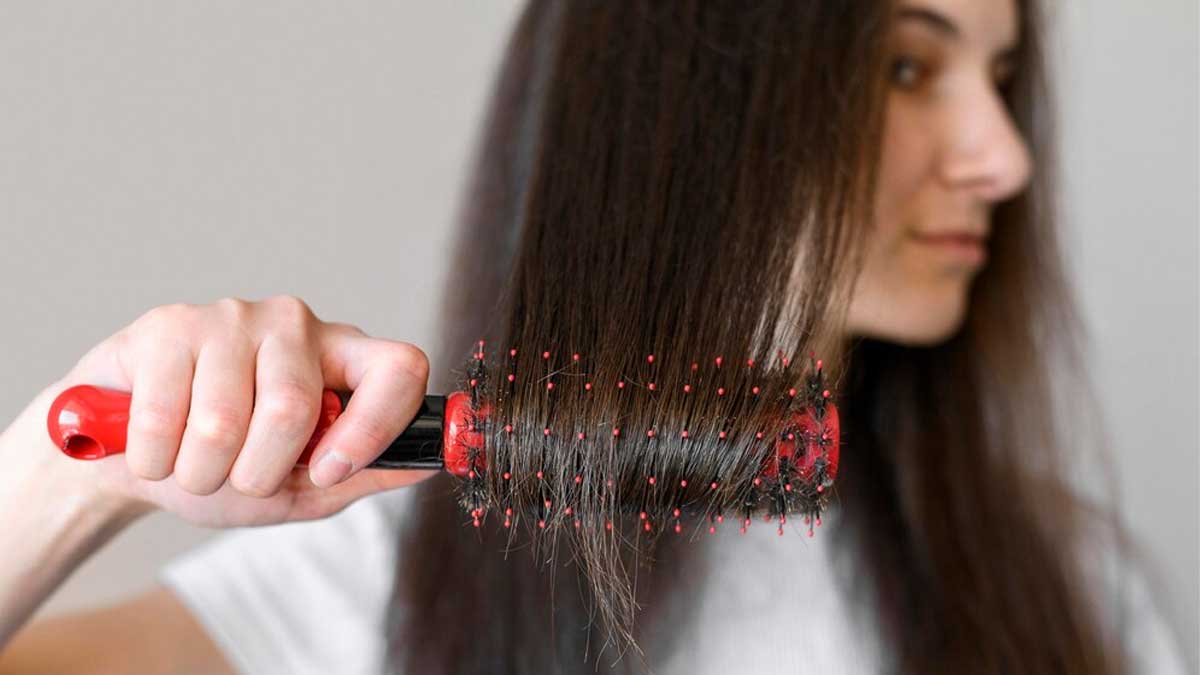
Nutrients such as protein, iron, and vitamins, including biotin (B7) and vitamin E, play an important role in maintaining your hair health. Hair thinning is a common problem that can be caused by several factors, such as age, genetics, and a condition called alopecia areata, which is an autoimmune disorder, according to the American Academy of Dermatology (AAD). Another common cause could be biotin or vitamin B7 deficiency, said Dr Raina Nahar, Consultant Dermatologist, Nanavati Max Super Speciality Hospital, Mumbai. In an interaction with the OnlyMyHealth team, she shed light on the role of biotin for hair health and shared ways to increase vitamin levels.
Table of Content:-
Also Read: Ayurvedic Herbs That Help Promote Hair Growth And Reduce Hair Fall
Role Of Biotin For Hair Health

Biotin is a crucial B vitamin that supports hair health by aiding in the production of keratin, the protein essential for hair structure, explained Dr Nahar, adding that it helps metabolise amino acids and fosters stronger hair follicles.
Therefore, low levels of biotin can lead to weakened hair structure, resulting in thinning, brittleness, and even hair loss, according to the doctor.
In a 2016 study published in the International Journal of Trichology, researchers found that 38% of the participants struggling with hair loss had biotin deficiency. Of these, only 11% of the biotin-deficient group reported risk factors like gastrointestinal issues or certain medications.
However, it's important to note that biotin deficiency as a sole cause of hair thinning is relatively rare, and other factors like genetics, overall diet, and health conditions also play significant roles in hair health, said Dr Nahar.
Symptoms Of Biotin Deficiency

Apart from hair thinning or hair loss, biotin deficiency can also cause additional symptoms, which include:
- Skin problems, such as rashes, dryness, or dermatitis
- Weak, brittle nails that may be prone to splitting or breaking
- Neurological symptoms like depression, lethargy, hallucinations, and numbness or tingling in the extremities
- Red and irritated eyes, specifically the inflammation of the conjunctiva, also called conjunctivitis
- Muscle pains or cramps
- Fatigue without any apparent cause
Note: While these symptoms might indicate a potential biotin deficiency, they can also be linked to various other health conditions. You must consult a doctor for a proper diagnosis and effective treatment.
Also Read: Delhi Fog: Hair Care Tips for Protecting Your Locks in Extreme Winter
How To Improve Biotin Levels

From dietary adjustments to supplementation, if necessary, there are many ways to improve biotin levels in the body. Let’s take a detailed look at them:
Include foods rich in biotin in your diet, such as eggs, nuts (especially almonds), seeds (like sunflower seeds), whole grains, spinach, sweet potatoes, mushrooms, and certain meats like organ meats, salmon, and pork.
Biotin supplements can help, but it's important to consult a healthcare professional before starting any supplementation to ensure an appropriate dosage and to avoid potential interactions or side effects.
Some hair products and treatments contain biotin, claiming to promote hair health when applied topically. However, their effectiveness in boosting biotin levels is still under discussion.
Maintaining an overall healthy lifestyle, including a balanced diet rich in nutrients, adequate hydration, regular exercise, and managing stress levels, can indirectly support biotin levels and overall health.
Conclusion
If you want great hair, healthy skin, and beautiful nails, then ensure that you have sufficient biotin levels in your body. Biotin, also known as vitamin B7, is essential for the metabolism of amino acids, the building blocks of proteins like keratin, which is a key component of hair. It is best to increase biotin intake through natural means like biotin-rich foods. However, if you want to resort to supplementation, speak with your doctor to discuss your requirements.
Also watch this video
How we keep this article up to date:
We work with experts and keep a close eye on the latest in health and wellness. Whenever there is a new research or helpful information, we update our articles with accurate and useful advice.
Current Version